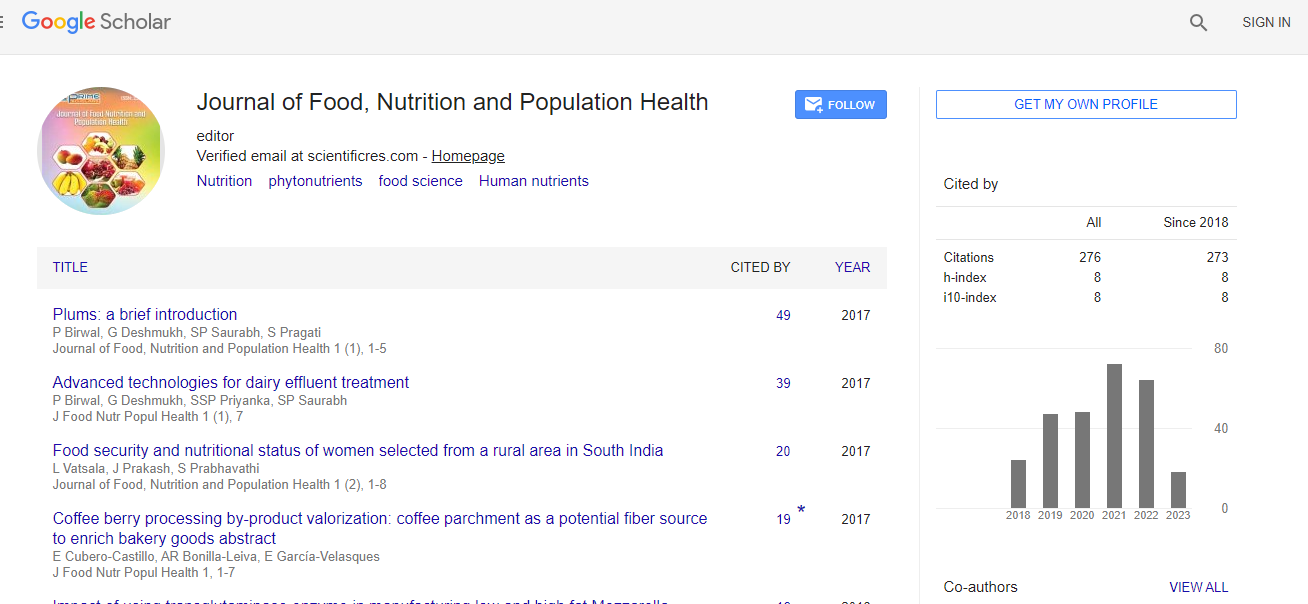Commentary - (2024) Volume 8, Issue 1
Understanding the Harmful Effects of Processed Foods
Noah Henry*
Department of Nutraceuticals, University of New Heaven, USA
*Correspondence:
Noah Henry,
Department of Nutraceuticals, University of New Heaven,
USA,
Email:
Received: 28-Feb-2024, Manuscript No. IPJFNPH-24-19934;
Editor assigned: 01-Mar-2024, Pre QC No. IPJFNPH-24-19934 (PQ);
Reviewed: 15-Mar-2024, QC No. IPJFNPH-24-19934;
Revised: 20-Mar-2024, Manuscript No. IPJFNPH-24-19934 (R);
Published:
27-Mar-2024, DOI: 10.21767/2577-0586.8.01.05
Description
In recent decades, the prevalence of processed foods in the
global diet has risen dramatically, driven by factors such as
convenience, affordability, and changing dietary habits. While
processed foods offer convenience and flavor, they often
contain high levels of salt, sugar, unhealthy fats, and food
additives, which can have detrimental effects on health. This
paper explores the harmful effects of processed foods on human
health and well-being. Processed foods are often stripped of
essential nutrients during manufacturing processes such as
refining, milling, and bleaching. Whole grains lose their fiber
and nutrient content when refined into white flour, while fruits
and vegetables lose vitamins and minerals when processed
into juices or canned products. As a result, consumption of
processed foods can contribute to nutrient deficiencies and
undermine overall nutritional status. Many processed foods are
loaded with added sugars, salt, and unhealthy fats to enhance
flavor, texture, and shelf life. Excessive consumption of these
ingredients has been linked to a range of health problems,
including obesity, type 2 diabetes, hypertension, heart disease,
and metabolic syndrome. Processed foods, such as sugary
snacks, sodas, fast food, and processed meats, are particularly
concerning due to their high levels of sugar, sodium, and
trans fats. Processed foods tend to be highly caloric and less
satiating compared to whole, unprocessed foods. This can lead
to overconsumption of calories and contribute to weight gain
and obesity. Research suggests that a diet high in processed
foods is associated with increased body weight, abdominal fat
deposition, and a higher risk of obesity-related complications.
The consumption of processed foods can negatively impact
gut health by altering the composition and diversity of the gut
microbiota. Processed foods high in sugar, salt, and additives
can promote the growth of harmful bacteria while suppressing
beneficial bacteria, leading to dysbiosis and inflammation in the
gut. This can contribute to digestive disorders such as irritable
bowel syndrome (IBS), inflammatory bowel disease (IBD), and
leaky gut syndrome. Processed foods often contain a myriad of
food additives, preservatives, flavorings, colorings, and other
chemicals to enhance taste, appearance, and shelf life. While
many of these additives are deemed safe for consumption in
small quantities, their long-term effects on health are not well
understood. Some additives have been linked to adverse health
effects, including allergic reactions, asthma, hyperactivity, and
carcinogenicity. The widespread consumption of processed
foods poses significant risks to human health and well-being.
From nutrient depletion and excessive sugar, salt, and unhealthy
fat content to adverse effects on gut health and exposure to food
additives and chemicals, processed foods contribute to a range
of health problems, including obesity, diabetes, cardiovascular
disease, and digestive disorders. As such, reducing reliance on
processed foods and prioritizing whole, unprocessed foods
rich in nutrients is essential for promoting optimal health and
longevity. By making informed dietary choices and embracing
a whole-food, plant-based diet, individuals can protect their
health and reduce their risk of chronic disease in the long term.
Excessive consumption of these ingredients has been linked to
a range of health problems, including obesity, type 2 diabetes,
hypertension, heart disease, and metabolic syndrome.
Processed foods, such as sugary snacks, sodas, fast food, and
processed meats, are particularly concerning due to their high
levels of sugar, sodium, and trans fats.
Acknowledgement
None.
Conflict Of Interest
None.
Citation: Henry N (2024) Understanding the Harmful Effects of Processed Foods. J Food Nutr Popul Health. 8:05.
Copyright: © 2024 Henry N. This is an open-access article distributed under the terms of the Creative Commons Attribution
License, which permits unrestricted use, distribution and reproduction in any medium, provided the original author and source
are credited

